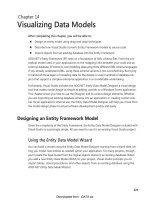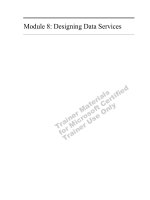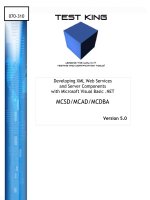designing data services and data models
Bạn đang xem bản rút gọn của tài liệu. Xem và tải ngay bản đầy đủ của tài liệu tại đây (259.29 KB, 4 trang )
Course Number: 1609A
Developed with KiZAN Corporation
1099 Part Number: X04-99423
Activity Manual
Designing Data Services and
Data Models
Information in this document is subject to change without notice. The names of companies,
products, people, characters, and/or data mentioned herein are fictitious and are in no way intended
to represent any real individual, company, product, or event, unless otherwise noted. Complying
with all applicable copyright laws is the responsibility of the user. No part of this document may
be reproduced or transmitted in any form or by any means, electronic or mechanical, for any
purpose, without the express written permission of Microsoft Corporation. If, however, your only
means of access is electronic, permission to print one copy is hereby granted.
Microsoft may have patents, patent applications, trademarks, copyrights, or other intellectual
property rights covering subject matter in this document. Except as expressly provided in any
written license agreement from Microsoft, the furnishing of this document does not give you any
license to these patents, trademarks, copyrights, or other intellectual property.
1999 Microsoft Corporation. All rights reserved.
Microsoft, MS-DOS, MS, Windows, Windows NT, Media, and PowerPoint are either registered
trademarks or trademarks of Microsoft Corporation in the U.S.A. and/or other countries.
The names of companies, products, people, characters, and/or data mentioned herein are fictitious
and are in no way intended to represent any real individual, company, product, or event, unless
otherwise noted.
Other product and company names mentioned herein may be the trademarks of their respective
owners.
Project Lead: Janet Robinson, Mark Bader
Instructional Designers: Mark Bader, Shawn Lock, Michas Sadzak
Program Managers: Mark Bader, Rama Biswas, Teresa Canady
Subject Matter Experts: Mark Bader, Whitney Roberts (KiZAN Corporation), Janet Robinson,
Scott F. Wilson (KiZAN Corporation)
Graphic Artist: Elizabeth Johanson (ArtSource, Inc.)
Editors: Joyce Cox (Online Training Solutions, Inc.), Todd Duft (Write Stuff), Elizabeth Hui
Reese (Write Stuff)
Testers: Chris Baca (Digital Counterbalance), Rick Carr (Digital Counterbalance)
Production Support: Linda Lu Cannon (Write Stuff), Marlene Lambert (Online Training
Solutions, Inc.), Eric Wagoner (Write Stuff)
Manufacturing Support: Julie Challenger, John Williams
Product Manager: Ron Wodaski
Business Manager: Roger Gerdes
Authors: Mark Bader, Whitney Roberts (KiZAN Corporation), Janet Robinson, Scott F. Wilson
(KiZAN Corporation)
Course Number: 1609A
Part Number: X04-99423
October 1999
Contents iii
Contents
Activity 1.1: Categorizing Existing Information 1
Objectives 1
Before You Begin 1
Scenario 2
Exercise 1: Categorizing Information 3
Activity 2.1: Identifying Services 5
Objectives 5
Before You Begin 5
Scenario 5
Exercise 1: Identifying Service Classes 6
Activity 3.1: Identifying Data-Related Use Cases and Data Requirements . 7
Objectives 7
Before You Begin 7
Exercise 1: Identifying Use Cases that Require Data 8
Exercise 2: Identifying Hidden Data Requirements 9
Exercise 3: Identifying Nonfunctional Requirements 10
Activity 3.2: Relating Data Requirements to Conceptual Design 11
Objectives 11
Before You Begin 11
Exercise 1: Analyzing Your Own Experience of Conceptual Design 12
Activity 4.1: Deriving Entities and Attributes from Data Requirements 13
Objectives 13
Before You Begin 13
Exercise 1: Identifying Data Entities 14
Exercise 2: Identifying Entity Attributes 15
Activity 4.2: Creating a Logical Data Model 17
Objectives 17
Before You Begin 17
Exercise 1: Identifying Relationships Between Entities 18
Exercise 2: Determining Cardinality and Existence 19
Activity 5.1: Identifying Keys in the Logical Model 21
Objectives 21
Before You Begin 21
Exercise 1: Identifying Keys 22
Activity 5.2: Normalizing Data 25
Objectives 25
Before You Begin 25
Exercise 1: Creating a Normalized Data Design 26
Activity 6.1: Translating the Logical Data Design 29
Objectives 29
Before You Begin 29
Exercise 1: Deriving a Physical Data Design from a Logical Data Design 30
Activity 6.2: Optimizing a Physical Data Design 35
Objectives 35
Before You Begin 35
Exercise 1: Determining Areas for Optimization 36
iv Contents
Activity 7.1: Identifying Data Integrity Requirements 39
Objectives 39
Before You Begin 39
Exercise 1: Determining Data Validity Requirements 40
Exercise 2: Determining Data Integrity Requirements 42
Activity 7.2: Determining Data Integrity Implementations 43
Objectives 43
Before You Begin 43
Exercise 1: Determining Integrity Implementations 44
Activity 8.1: Selecting Data Access Technologies 47
Objectives 47
Before You Begin 47
Scenario 47
Exercise 1: Identifying Data Access Considerations 48
Exercise 2: Selecting Data Access Technologies 49
Activity 9.1: Data Quiz 51
Objectives 51
Before You Begin 51
Exercise 1: Playing the Data Quiz 52
Appendix A: Ferguson and Bardell, Inc. Case Study 55
The Company 55
Corporate Vision 55
Corporate Profile 55
Current Status 56
Future Business Directions and Plans 56
Corporate Challenge 57
Technology 57
Recent Staffing Changes 57
Current Technologies 58
Future Technology Directions 59
Time and Billing 59
Resource Scheduling 59
Timesheet System 61
Timesheet Data Entry 63
Business Issues Related to Time and Billing 64
Additional Interviews 65
Chief Information Officer 65
Consultant 66
Manager 66
Administrative Assistant 66
Support 67









